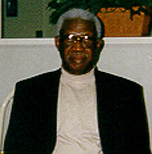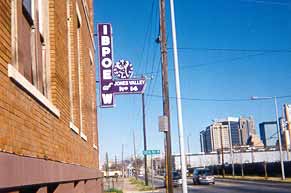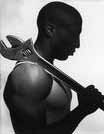|

|
|
Alabama State I.B.P.O.E. of W. President: Alexander Ashley
|
 Alexander
Ashley is currently the President of the Alabama State Association of the
Improved and Benevolent Protective Order of the Elks of the World. Mr. Ashley
has been involved in the organization for some 40 years. He joined while
he was enrolled in college. Mr. Ashley feels that for him, at the time,
the organization caught his attention because of what they could do, both
for the community and for themselves. As it happened, Mr. Ashley was involved
in the drama program of the state HBCU in Alabama, and knowing this, one
of his associates who was a principal at the McCord public school asked
Mr. Ashley if he would help his lodge with an interstate scholarship program
which was based on oratory competition. The program involved young students
not only from Alabama, but also from Arkansas, Mississippi, Lousiana, Georgia,
Florida, Tennessee, and South Carolina. The scholarship was worth 15,000
dollars, some thirty odd years past. Mr. Ashley was impressed with the organization
and saw about joining. Alexander
Ashley is currently the President of the Alabama State Association of the
Improved and Benevolent Protective Order of the Elks of the World. Mr. Ashley
has been involved in the organization for some 40 years. He joined while
he was enrolled in college. Mr. Ashley feels that for him, at the time,
the organization caught his attention because of what they could do, both
for the community and for themselves. As it happened, Mr. Ashley was involved
in the drama program of the state HBCU in Alabama, and knowing this, one
of his associates who was a principal at the McCord public school asked
Mr. Ashley if he would help his lodge with an interstate scholarship program
which was based on oratory competition. The program involved young students
not only from Alabama, but also from Arkansas, Mississippi, Lousiana, Georgia,
Florida, Tennessee, and South Carolina. The scholarship was worth 15,000
dollars, some thirty odd years past. Mr. Ashley was impressed with the organization
and saw about joining. |
| Mr. Ashley was also drawn to the Elks organization because of the climate of the times. When he joined, there were
very few places where African American men and women could go. The Elks provided a safe haven for many Black men.
The local high schools and other civic organizations would have their functions, meetings, and gatherings at the
Elks lodge. Since hotels, meeting rooms, and gymnasiums were not open to African Americans, the Elks lodge's function
in this capacity was invaluable. Mr. Ashley, upon his matriculation at the University of Indiana grad school, boarded
at the local Elks lodge. The Elks provided a forum for their members. At times the individual lodges would host
speakers for the edification of their members. The Elks were politically neutral as an organization. But as individuals,
since the members of the organization came from such a wide variety of backgrounds and vocations, the Elks represented
a powerful, though not specifically organized force in politics and labor. The solidarity and support of the lodge
was invaluable when Elks were laid off or were forced to go on strike. On an individual level Elks broke many barriers,
in labor and civil rights. For example, at one time in Alabama, the engineers on the L&L railroad were prohibited
to be African American. But, in the end, the first two African American engineers on the line were Elks. |
The I.B.P.O.E. of W. was at one time, according to Ashley,
a part of the B.P.O.E. However, in an antagonistic relationship similar
to that experienced by the Freemasons, the white organization denied any
connection and, in the case of the Elks, accused the I.B.P.O.E. of W. of
stealing the papers and proceedures of the organization. For this reason,
the African American Elks were forced to create another set of proceedures
of their own. Of late, the organization has  undergone
significant restructuring within the state of Alabama. The president of
the organization some four years past, Malcolm Thomas, sued the Alabama
State Association following his refusal to step down from his post. Thomas
recieved a favorable decision in Dallas County, but when the case was transferred
to Winton North Carolina, the court decided against him. The matter deadlocked
after a fashion, and, in an emergency election, Ashley became President.
In the Elks auxillary female organization, the Daughter Elks, there is also
a President and for each Lodge, there is a Temple of Daughter Elks. The
Daughter Elks operate under the original I.B.P.O.E. of W. as a sort of subsidiary.
At present the parent organization is forbidden to do business in the state
of Alabama until the federal court arbitrates the matter of the suit. The
Grand Lodge's relation to the Alabama State Association is restricted, and
the organization can only be quasi-recognized in the state of Alabama. undergone
significant restructuring within the state of Alabama. The president of
the organization some four years past, Malcolm Thomas, sued the Alabama
State Association following his refusal to step down from his post. Thomas
recieved a favorable decision in Dallas County, but when the case was transferred
to Winton North Carolina, the court decided against him. The matter deadlocked
after a fashion, and, in an emergency election, Ashley became President.
In the Elks auxillary female organization, the Daughter Elks, there is also
a President and for each Lodge, there is a Temple of Daughter Elks. The
Daughter Elks operate under the original I.B.P.O.E. of W. as a sort of subsidiary.
At present the parent organization is forbidden to do business in the state
of Alabama until the federal court arbitrates the matter of the suit. The
Grand Lodge's relation to the Alabama State Association is restricted, and
the organization can only be quasi-recognized in the state of Alabama. |
At present the most serious threat to the Elks is the changing
times. At one time the Elks' motto of Charity, Justice, Brotherly Love,
with Fidelity was a beacon to African-American men of every description.
Now, it seems, the membership is dropping. The Lodges still make significant
and valuable contributions to the United Negro College Fund, the NAACP,
and  local
causes. But in spite of efforts to remain active in the community, assisting
the elderly and forming youth groups and such, the Elks continue to diminish
in the state of Alabama. The youth of today, according to Ashley are not
as attracted to the organization as they might have once been. After desegregation,
many of the functions of the lodge were, in a way, hindered. One need not
necessarily, though African American, stay out of the downtown, or be barred
from reserving a ballroom or be disallowed to enter a given bar. At one
time, according to Ashley, the Elks Lodge was "the place we could go".
This phenomenon, and even more so, the changing mentality of youth today,
threatens to make the I.B.P.O.E. of W. extinct. However, in researching
this specific group of men and women, one can see clearly many of the strongest
elements of African American history as well as garner invaluable truths
concerning the nature of Black socio-cultural presence. local
causes. But in spite of efforts to remain active in the community, assisting
the elderly and forming youth groups and such, the Elks continue to diminish
in the state of Alabama. The youth of today, according to Ashley are not
as attracted to the organization as they might have once been. After desegregation,
many of the functions of the lodge were, in a way, hindered. One need not
necessarily, though African American, stay out of the downtown, or be barred
from reserving a ballroom or be disallowed to enter a given bar. At one
time, according to Ashley, the Elks Lodge was "the place we could go".
This phenomenon, and even more so, the changing mentality of youth today,
threatens to make the I.B.P.O.E. of W. extinct. However, in researching
this specific group of men and women, one can see clearly many of the strongest
elements of African American history as well as garner invaluable truths
concerning the nature of Black socio-cultural presence. |
|

|

|
NEXT
|